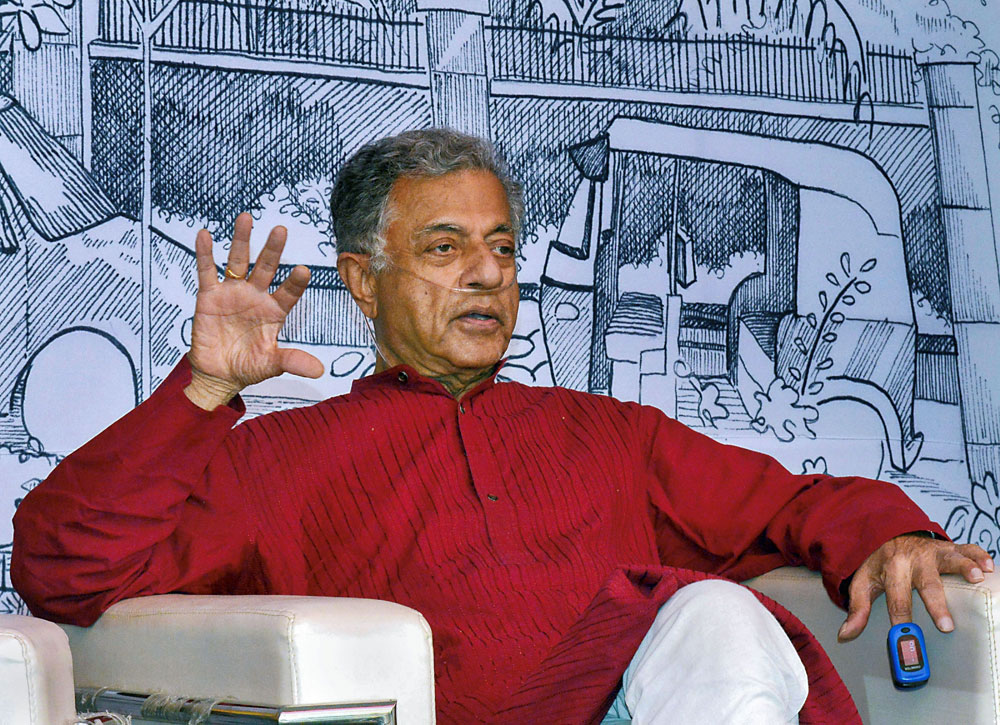Actor, playwright, film-maker and activist Girish Karnad breathed his last at 6.30am on Monday at a Bangalore hospital. With his passing, Kannada culture has been dealt a body blow.
Karnad was born in Matheran in present-day Maharashtra. He earned his bachelor in arts degree in math and statistics from Karnataka Arts College in Dharwad. Later, he attended the University of Oxford as a Rhodes Scholar.
Many of his plays were seen as a statement on contemporary politics. Karnad won several awards in his lifetime, including the Padma Shri in 1974 and Padma Bhushan in 1992. He also won the Jnanpith award in 1998 for his contribution to literature.
Karnad was a vociferous proponent of the freedom of expression and multi-culturalism. He was opposed to Hindu fundamentalism. He had worn a placard that read “Me Too Urban Naxal” at an event to mark the first anniversary of journalist Gauri Lankesh’s death.
Karnad’s plays dallied with history, folklore and mythology. The plays, mostly written in Kannada, were translated into English and several Indian languages, receiving critical acclaim. These works of Karnad help us gauge his contribution to Kannada culture and the greater Indian consciousness:
Yayati
The story of Karnad’s first play Yayati was taken from the Mahabharata and the Puranas. The play deals with sacrifice, responsibility and self-realization. The central character of the play, Yayati, was presented to reflect the modern alienated man with his insatiable desires. The story revolves around the exchange of youth between son and father.
Taledanda
This 1990 play is about the reform movement, Lingaytism, in 12th century Karnataka. The play draws parallels between the economic and socio-political conditions of the time. The Bhakti movement has clear imprints on the play. The effort to introduce societal changes ends in chaos and violence. The contradictions in the social structure have a role to play in how Taledanda concludes.
The Dreams of Tipu Sultan
This play was written in 1997 as Tipu Sultan Kanda Kanasu. It has been performed across the world and the importance of the play has been acknowledged by numerous scholars. In the play, Karnad recounts the last days of Mysore’s king through the eyes of a British scholar and a court historian.
Tughlaq
This remains one of Karnad’s most popular works. Tughlaq in the play’s title refers to Mohammad bin Tughlaq, an eccentric yet well-intentioned ruler of Delhi. The play, written in 1964, is a critique of the Nehruvian era which began with certain ideals but ended in disillusionment.
Samskara
Parallel cinema in Karnataka made its debut with Samskara. The movie was based on the novel by U.R. Ananthamurthy. Karnad played the role of Praneshacharya in the movie. He would go on to act in several movies after the success of Samskara, including in movies like Nishant. In recent years, he acted in popular Hindi films like Ek Tha Tiger and its sequel, Tiger Zinda Hai.
Turning Point
Turning Point demonstrated in the 1990s that TV could be interesting despite budget constraints. Karnad was the presenter of the show that began telecasting in 1991. Co-presenter Yash Pal, the noted scientist, would complement Karnad’s effortless charm with acute observations on everything scientific. The weekly science programme was divided into several sections, including Looking Glass and Tailpiece, each of which lasted about eight minutes.










